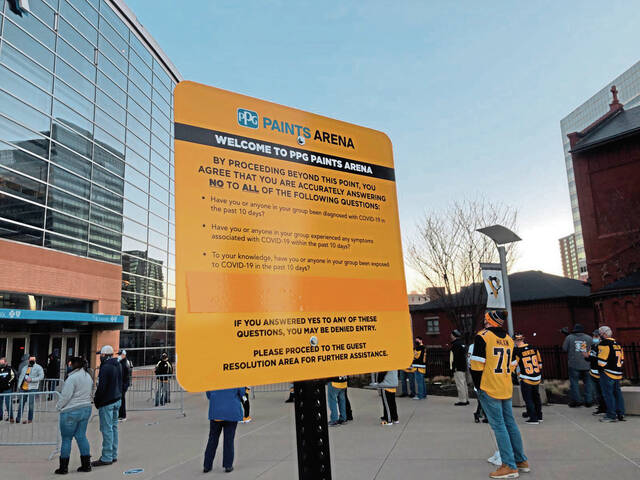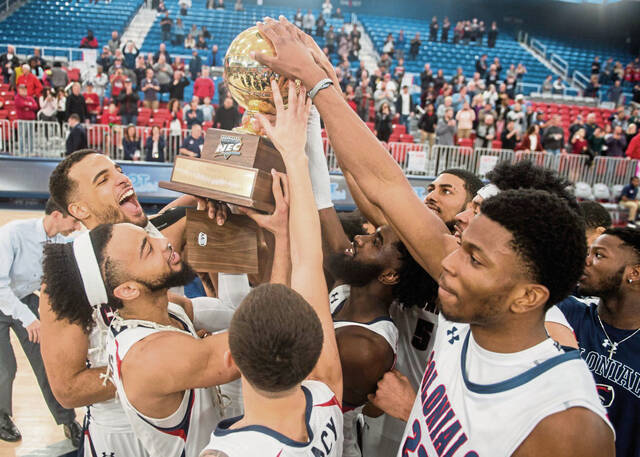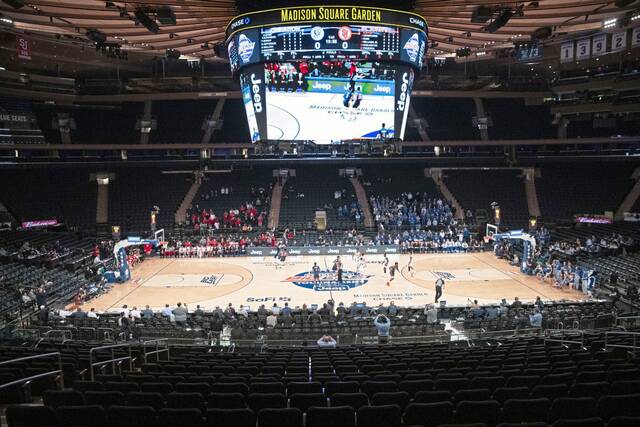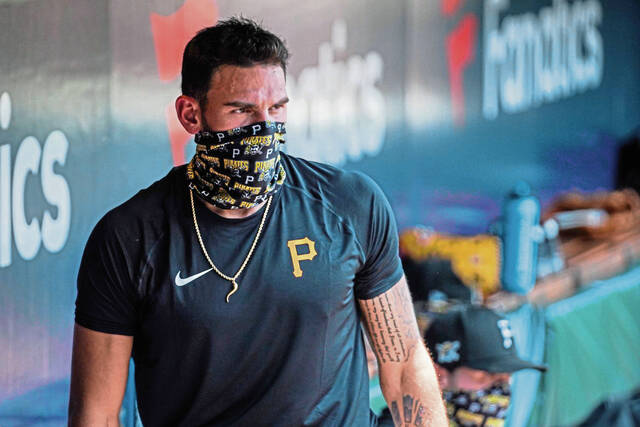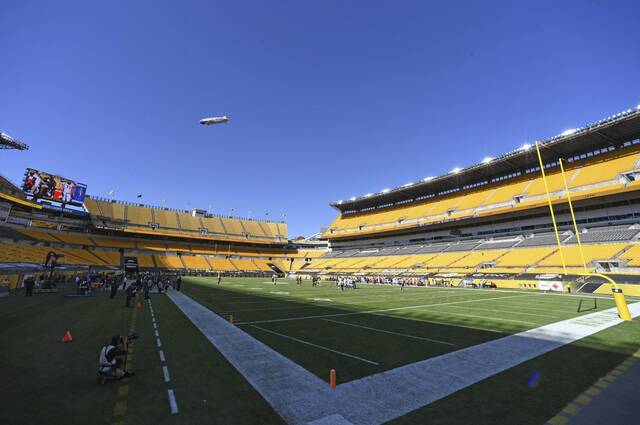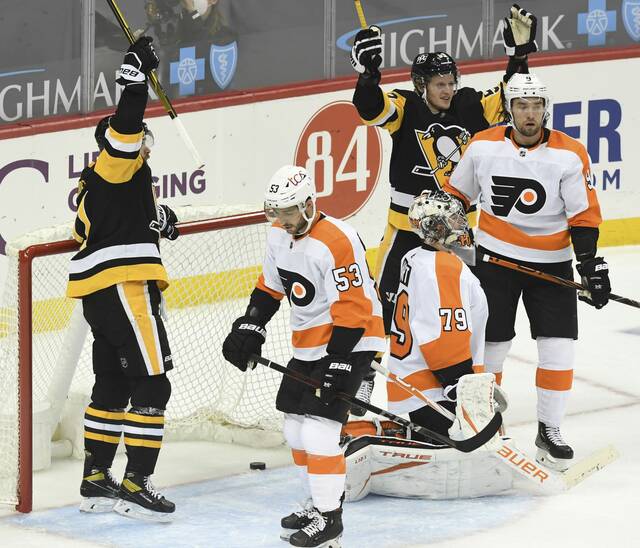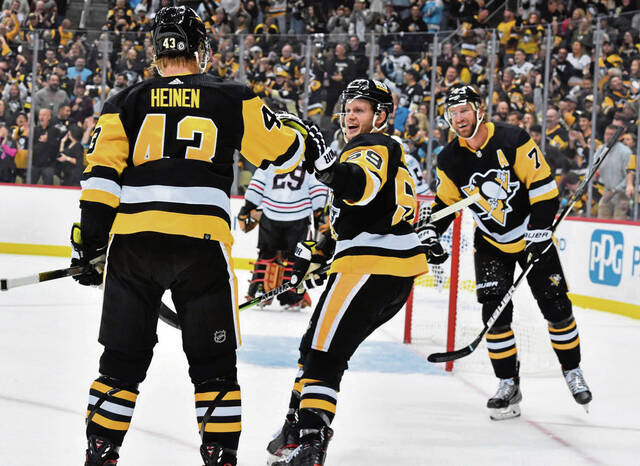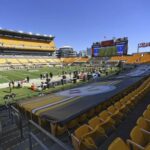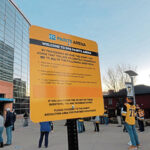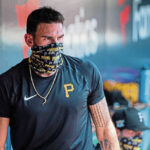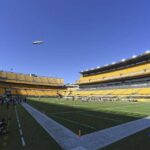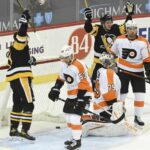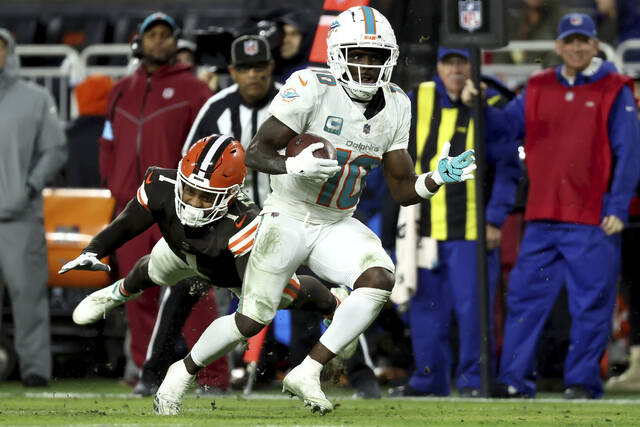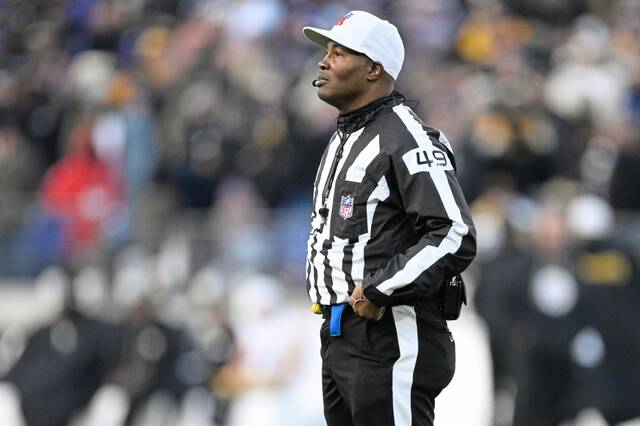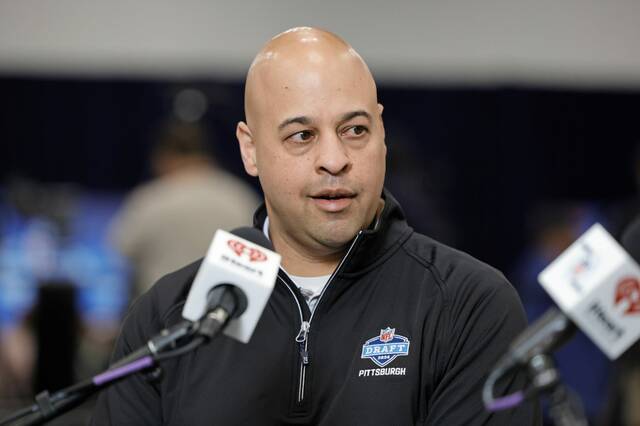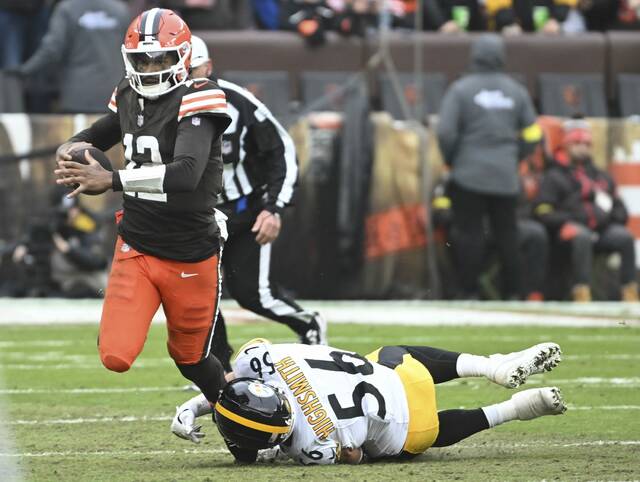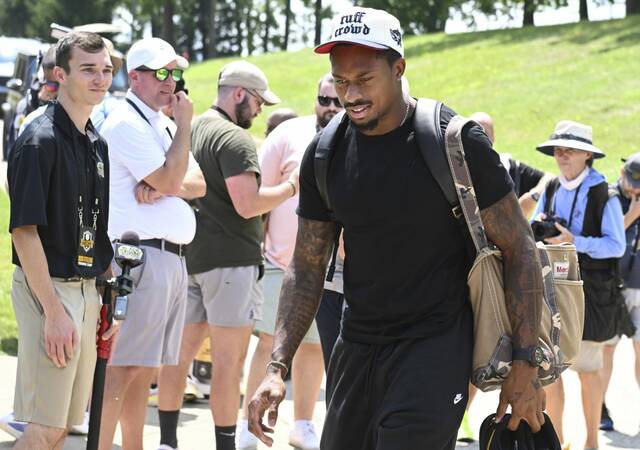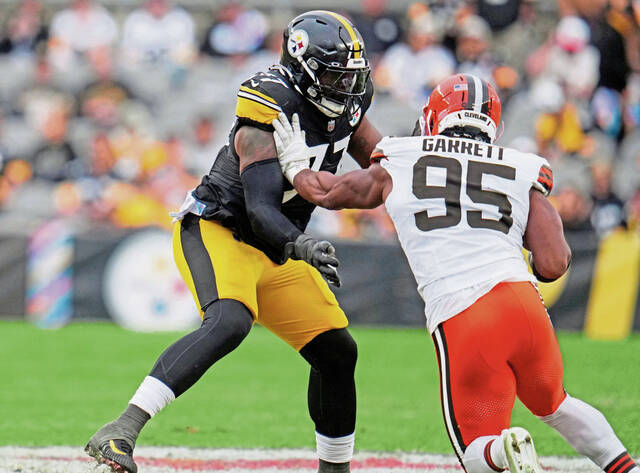The covid-19 pandemic affected all corners of humanity in the United States, touching everything from myriad industries to patterns of social interaction to politics and methods for healthcare. Sports might not have the societal importance of many of the other areas, but it did serve as a significant public bellwether for both the abrupt screeching halt of the world as we knew it as well as for the gradual return to normalcy.
As the covid pandemic turns 5 years old this spring, here’s a timeline of the role of the sports world — both locally and across the U.S. — in that unforgettable period of world history:
Shutting down
March 8: Five weeks after the Australian Open drew record crowds, the BNP Paribas Open in Indian Wells, Calif. — arguably the tennis world’s most renowned tournament outside of the Grand Slams — is canceled after a positive covid test in the Coachella Valley area. It is the first significant U.S.-based sporting event canceled.
March 8: The PIAA acknowledges how the coronavirus is affecting its ongoing Pennsylvania winter high school sports championship season, releasing a list of guidelines that include: “Pre-game and post-game handshakes may be replaced with fist pumps, forearm pumps or elbow pumps.”
March 9: In a joint statement, the NHL, NBA, MLS and MLB announce that access to locker rooms would be restricted. This bans media from pre- and post-game interviews in those settings, instead moving them to socially distanced locales such as podiums.
March 10, 11:30 a.m.: The Ivy League cancels its annual men’s and women’s basketball tournaments, another step in covid-related cancellations reaching the mainstream of American sports.
March 10, 5:13 p.m.: In the wake of growing virus concerns, the Columbus Blue Jackets release a statement that “scheduled games will go on as scheduled and be open to ticketed fans.” It reiterates that position 40 minutes later on social media. Late the next morning, general manager Jarmo Kekalainen addresses reporters about the decision. Those in Pittsburgh have a keen interest in the situation because the Blue Jackets’ next scheduled game is 48 hours later at home against the Penguins.
March 10, 7 p.m.-9:30 p.m.: The Penguins beat the New Jersey Devils, 5-2, in front of an announced crowd of 13,473 in Newark, N.J. The team boards a charter flight to Columbus after the game, not realizing at the time that their regular season had ended.
March 10, approx. 8:50 p.m.: Robert Morris defeats Saint Francis, 77-67, in the Northeast Conference men’s basketball championship game in front of a packed UPMC Events Center in Moon Township. The win secures the Colonials an automatic berth to the NCAA Tournament, eliciting a jubilant celebration with hundreds of fans storming the court.
March 11, late morning: Mt. Lebanon School District announces that it was not allowing its boys basketball team to travel that day to Chambersburg for a PIAA playoff game against Cheltenham.
March 11, 1 p.m.: The Penguins take the ice for a practice at Nationwide Arena, less than a mile from the Ohio Statehouse where Gov. Mike DeWine is holding a news conference relating to covid-19. After practice, the biggest topic of conversation between players and socially distanced reporters was not any current world events but instead an ill-advised slashing penalty Kris Letang took late in the game against the Devils.
March 11, 1:54 p.m.: The Golden State Warriors became the first prominent U.S. pro sports team to announce it would play a game without fans as a safety precaution against the virus. The Warriors were to host the Brooklyn Nets two days later at Chase Center.
March 11, 2:36 p.m.: DeWine posts on social media that in his state, “(F)or indoor events, we are asking for no events with spectators other than the athletes, parents and others essential to the game.” Ten minutes later, he posts on what was then called Twitter thanking those who chose to limit gatherings. “For the others, there will be an order.” That formal action follows within the next three hours.
March 11, approx. 3 p.m.: A few hours after the city of Pittsburgh canceled the popular annual St. Patrick’s Day parade scheduled for March 14, the Penguins announce their intention to host a scheduled March 15 game with the full allotment of ticketed fans. The team cites myriad health precautions such as hand sanitizer stations, posted CDC advisories and gloves to be worn by ushers and food handlers.
March 11, 5:47 p.m.: The Blue Jackets announce they will abide by the state mandate, meaning the next day’s game against the Penguins was to be played in the eerie atmosphere of an empty arena.
March 11, 9:31 p.m.: Word breaks via an ESPN report that Utah Jazz center Rudy Goebert had tested positive for covid just before scheduled tip-off of a game in Oklahoma City against the Thunder. Not long after, fans are told the game was postponed and are asked to leave arena.
March 11, 9:31 p.m.: In an almost previously unthinkable development, the NBA announces it was suspending the remainder of its ongoing season “until further notice.” Games that evening played on and would end up being the final contests of the originally scheduled 2019-20 NBA regular season.
March 12, 11:45 a.m.: One by one, major conferences cancel the remainder of their basketball tournaments. The Big Ten, SEC and American Athletic make their announcements within 3 minutes of each other, with the ACC, Pac-12 and Big 12 following suit within an hour.
March 12, 1:09 p.m.: The Big East was the lone holdout, as Creighton and St. John’s tipped off just after noon at Madison Square Garden in front of no fans from the general public. By halftime — with St. John’s winning 38-35 — the conference canceled the remainder of the game and the event.
March 12, 12:04 p.m.: The PIAA announces a “postponement” of its winter championships, including the boys and girls basketball tournaments. The ensuing update about the events states the postponement is for “a minimum of two weeks.” The PIAA and WPIAL are telling member schools that the decision to play regular-season games/matches in spring sports is left up to them.
March 12, 1:05 p.m.: First pitch of what ended up a full, nine-inning Grapefruit League game between the Pirates and Toronto Blue Jays is played in front of an announced crowd of 5,273 at LECOM Park in Bradenton, Fla. The game ended, according to its box score, at 4:14 p.m.
March 12, 1:30 p.m.: Word leaks that the NHL decided to “pause” its season. The official announcement soon follows, with the statement quoting commissioner Gary Bettman that the league’s goal was “to resume play as soon as it is appropriate and prudent, so that we will be able to complete the season and award the Stanley Cup.”
March 12, 3:10 p.m.: Major League Baseball announces that, effective at 4 p.m., its spring training was suspended. MLB stated that its regular season would be delayed “by at least two weeks.”
March 12, 4:16 p.m.: The NCAA cancels all of its winter and spring season national championships, including the iconic men’s basketball tournament that was scheduled to begin five days later. That afternoon, Robert Morris coach Andy Toole somberly gathers his team to tell them about the cancellation. Those Colonials players would never get to play in March Madness.
March 13: Augusta National announces that The Masters would be postponed. It would get contested in November. The U.S. Open, likewise, was ultimately bumped to September, and the PGA championship moved from May to August. The British Open would be canceled in 2020.
March 24: The Tokyo Summer Olympics were postponed by a year from the original summer 2020 date, a heretofore unthinkable development for the massive international quadrennial event.
March 26: The MLB and MLBPA come to an agreement on the parameters of a 2020 season. Among the conditions: any season must be at least 60 games in length, player salaries would be 100% pro-rated and players would receive credit for a full season’s worth of service time. Remaining issues could later be bargained when it was deemed safe to play.
April 1: It was announced that for the first time since World War II that Wimbledon would be canceled. While the U.S. Open went on during its normal August-September window — albeit with no fans in attendance — from Sept. 27-Oct. 11 with significantly limited crowd restrictions in Paris.
April 6: The NFL announces the April 23-25 draft will be “fully virtual.” Previously scheduled for Las Vegas, the “Zoom” lifestyle that so many Americans had quickly adapted to would come to a major sporting broadcast in which team personnel announced selections via grainy teleconferencing video.
April 9: After Pennsylvania Gov. Tom Wolf announces that all schools in the state will remain closed through the end of the academic year, the PIAA officially cancels the winter sports championships and spring sports schedules.
Slow return to normal
May 26: The NHL announces its plan to resume its season: go directly to the playoffs, with each conference staged in a “bubble” at a host city to be determined. The format would allow 24 teams into the playoffs, 50% more than usual. The added first round would be best-of-five.
May 29: The NBA announces its similar return-to-play protocol, with the season to resume in an Orlando “bubble.” Clubs within six games of a playoff spot would end up reporting to Disney’s Wild World of Sports Complex to play eight regular-season games each. A traditional playoff format was to follow.
June 8: After all organized team activities and minicamp are held virtually without on-field team practice sessions, the Steelers announce that training camp will be staged at what was then called Heinz Field. When the team began its first workout six weeks later, it marked the first time since 1965 that Saint Vincent College in Unity was not where players reported.
June 8: After failing to come to an agreement with the players’ union about the length and format of a season, MLB owners unanimously vote to unilaterally implement a 60-game schedule with a 16-team playoff format that will begin July 24.
July 3: The Pirates open training camp (affectionately referred to as “The Deuce”) at PNC Park. Though the minor-league season is canceled, each team has an “alternate training site” for selected minor leaguers that can be accessed for call-ups.
July 23: The MLB season opens with a pair of games played in empty stadiums. The highlight was the New York Yankees winning at the defending World Series champion Washington Nationals during which Dr. Anthony Fauci threw a ceremonial first pitch.
July 24: The Pirates open their 2020 season with a 5-4 loss at the St. Louis Cardinals. Their home opener three days later was also a loss and also sans fans with piped-in crowd noise, as all games for teams would be all regular season. Facing only NL Central and AL Central opponents, the Pirates would finish an MLB-worst 19-41, accounting for one of the ugliest winning percentages in the history of the majors.
July 30: The NBA again played meaningful games, with players living in isolation under strict protocols complete with a hotline allowing individuals to anonymously report those who broke the rules. The playoffs tournament began Aug. 17, and the NBA Finals started Sept. 30.
Aug 1: The NHL postseason begins with the Eastern Conference teams in Toronto and the West in Edmonton, featuring games in empty arenas and players/staff in isolation. The four teams with the best record in the East and West played a “seeding round robin,” with the next eight in each conference’s standings playing best-of-five series. The winners advanced to best-of-seven conference quarterfinals, semifinals and finals. Seeded fifth, the Penguins lost to No. 12 Montreal, 3 games to 1.
Aug. 6: The ACC announces a revised football schedule for member schools, including Pitt. The Panthers end up playing home games that fall at an empty Heinz Field. They open camp in early August at their facility on the South Side.
Aug. 11: The Big Ten and Pac-12 announce they will not be playing any of their fall athletics that autumn. That includes football, the high-profile, revenue-generating sport. The SEC, ACC, Big 12 and some smaller conferences are undeterred and move forward.
Late August: Slowly and via announcement by individual team, it becomes clear the NFL will open its season with few or no fans at virtually all of its games. Teams are largely at the mercy of deferring to state and local government mandates.
Sept. 14: The Steelers open their season with a 26-16 victory at the New York Giants. The only fans viewing it were doing so on television via the “Monday Night Football” broadcast. MetLife Stadium in East Rutherford, N.J., is empty, just as Heinz Field would be six days later when the Steelers opened their home schedule with a 26-21 win against the Denver Broncos.
Sept. 16: Weeks after Big Ten commissioner Kevin Warren reiterated the conference’s decision to forgo football that autumn “will not be revisited,” the conference reverses course and approves a limited schedule. It opens in late October with no fans throughout the season.
Sept. 19-28: The Tampa Bay Lightning win the Stanley Cup Final, beating the Dallas Stars, 4 games to 2, capping more than nine weeks in the “bubble” format. The Lightning, at least, got to take in slightly different surroundings in that the final was held in Edmonton. Stars players and staff spent more than nine weeks there. No players or other league personnel tested covid positive throughout the postseason.
Oct. 11: The Los Angeles Lakers complete a 4-2 series win against the Miami Heat to claim the NBA championship. Like the NHL, the NBA made it through its “bubble” unscathed: zero positive covid tests.
Oct. 20: After a best-of-three wild card round in which the higher seeded team hosted all games and division series and league championship series getting staged at neutral sites earlier in the month, the World Series opened with Game 1 between the Los Angeles Dodgers and Tampa Bay Rays at Globe Life Park in Arlington, Texas. Crowd numbers are limited to 11,500 (25% of capacity).
Oct. 27: The Dodgers clinch the championship with a 3-1 victory in Game 6. Ironically, Dodgers third baseman Justin Turner became the first player to test covid positive over the entire postseason bubble. He was removed from the game during the eighth inning of the final game but created a controversy when he returned to the field to take part in the championship celebration with teammates.
Nov. 25: Its previous season having ended 8½ months prior with a loss in the ACC tournament hours before that event’s cancellation, Pitt men’s basketball opens its 2020-21 season with an 80-70 loss to Saint Francis in front of no paying fans at the Petersen Events Center. Continually evolving state law at that point is allowing no gatherings of more than 500 people.
Dec. 20: The NHL announces a plan for a 2020-21 season that would feature four revised divisions and a 56-game schedule composed entirely of intradivision play. The temporary realignment was necessitated because Canadian authorities had instituted strict travel restrictions in and out of its country, leading to a seven-team, “North” division of all Canadian-based clubs.
Jan. 10, 2021: With coach Kevin Stefanski and star players Joel Bitonio and Denzel Ward back in Cleveland because of positive covid-19 tests, the Browns shock the Steelers with a 48-37 playoff victory in front of no paying customers at Heinz Field. The Steelers had petitioned Wolf’s office to allow a limited number of ticketed fans but were denied, limiting the total venue gathering to 2,500 individuals.
Jan. 13-15, 2021: The Penguins open their season with a pair of losses at the Philadelphia Flyers, a “homestand/series” scheduling phenomenon pervasive throughout the ensuing four months as the NHL worked to best limit travel. Per state edict, the Penguins played home games in front of no fans until 15% were allowed beginning March 1 and 25% starting April 15. A mishmash of differing attendance policies pockmarked the league’s teams and venues.
Back in the game
March 2, 2021: After Wolf’s office releases revised guidelines, the Penguins play in front of ticketed fans at home for the first time in 360 days, beating the Flyers, 5-2, in front of a sellout crowd of 2,800. The Penguins’ season would end with a first-round playoff loss in May. By their final home postseason game in late May, 9,344 were permitted on hand at PPG Paints Arena.
April 8, 2021: Seven days after opening the season in front of a one-quarter-full Wrigley Field, the Pirates host the Cubs in their home opener with PNC Park limited to 7,749 fans (25%) and advertising tarps still covering many seats. In June, the capacity was bumped up to approximately 55%. By July, full capacity was permitted.
July 23, 2021: The summer Olympics — still branded “Tokyo 2020,” complete with the ubiquitous signage spotted during broadcasts — open in Japan but with few or no fans on hand at the myriad venues.
Sept. 19, 2021: Though they again staged training camp at Heinz Field, the Steelers, by all other measures, open a “normal” home season in front of a sellout of 63,707 fans in a 26-17 defeat to the Las Vegas Raiders. Locker rooms remain closed to media throughout the 2021 season, and players remained subjected to covid tests.
Oct. 16, 2021: The Penguins draw a sellout — announced at 18,420 fans — for their season home-opening win against the Chicago Blackhawks. It’s the first hockey game in Pittsburgh with a full complement of spectators in more than 19 months. Ironically, the 14-year streak of 633 consecutive sellouts would end in the Penguins’ next home game three days later against the Dallas Stars.



